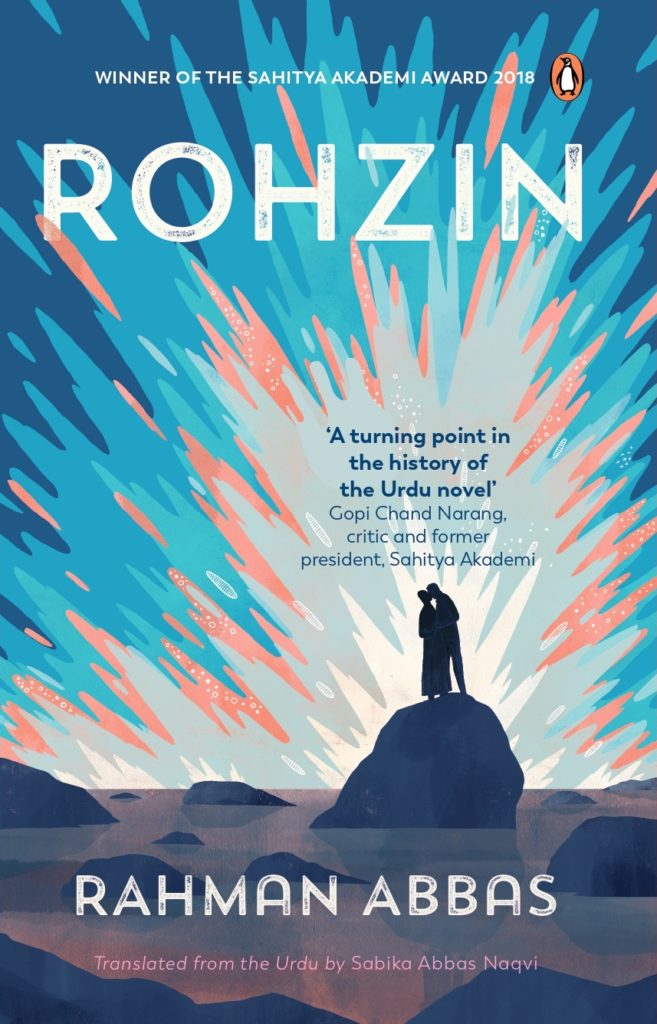Rahman Abbas’ Rohzin, translated by Sabika Abbas Naqvi, studies various aspects of human emotions, especially love, longing and sexuality as sublime expressions. The emotions are examined, so is love as well as the absence of it, through a gamut of characters and their interrelated lives: Asrar’s relationship with his teacher, Ms Jamila, a prostitute named Shanti and, later, with Hina; Hina’s classmate Vidhi’s relations with her lover and others; Hina’s father Yusuf’s love for Aymal; Vanu’s indulgence in prostitutes.
Rohzin dwells on the plane of an imagination that takes readers on a unique journey across the city of Mumbai, a highly intriguing character in its own right.
The following is an excerpt from the book.

For Want of a Voice, in Answer of My Own
There was a huge crowd in the courtyard. Many peepal trees had found their way to grow through the cracks in the walls. Several pigeons sat on the roof. When the bomb blast took place between Zaveri Bazaar and the temple on 25 December 2003, another one had taken place near the Gateway. Nearly twenty-four people had died in the blasts. Most of them were identified. There were four unfortunate people whose bodies were burnt to ashes in the explosion. Their souls had cracks too. These cracks had appeared because of their sudden death and the sudden separation of the soul from the body.
For many days these mortified souls sat hidden in the drains below the temple. Mumba Devi was given this information by a dev. Mumba Devi gave him a mantra, a spell, and said that he should bring the souls in front of the temple and then chant the mantra. He obeyed her. The mortified souls transformed into beautiful white pigeons. Since then, these pigeons have stayed on the temple premises. They were distinct from the regular, common pigeons. The common pigeons keep expressing love all the time, whereas these pigeons were love-deprived. They stared at the skies with blank eyes and the skies stared back, because the skies have stars which don’t just carry wounds of the 25 December blast but also know of the 31 July 2011 blasts. They are also aware of the 2006 train blasts, the 26 November sea attack on Mumbai, the Ghatkopar and other blasts. Were these supernatural calamities responsible for Mumba Devi’s immense grief? Had Brahma already informed her of these unfortunate incidents which had spread an ambiguous silence on her face?
A pigeon bent to look at Asrar and gestured to another one. They had felt something after seeing Asar’s soul. Soon, all the pigeons were looking down at Asrar while he stared at the children who carried red, orange and yellow garlands for Mumba Devi.
They hired a taxi from Kalbadevi to go to Bhindi Bazaar, where Asrar bough tea powder, dates, rusks, cups, saucers, glasses and other household items. They reached the room at nine in the night.
Mohammad Ali was waiting for him.
He informed him that they had to go to their boss’s house. Asrar rested for about ten minutes and then they left the kholi.
It was raining outside. Ali wore a raincoat and Asrar took an umbrella. Moosa Patel lived on the twentieth floor of a skyscraper in Colaba. His wife opened the door. They entered the house and Patel’s wife served them water.
Moosa Patel emerged from his room, exchanged greetings and then handed them an envelope. He told them that Yaqoob Umar Ibn Maqallab Mahayat’s maternal cousin, Ranjeeda Maqallab, would collect this cheque from them the following day in the office. Moosa told them that he was going to China to attend a diamond exhibition. Then he looked at Asrar and said, ‘Do not go and stay put at the village, do return. And convey my wishes to your family.’ Asrar replied with a smile, ‘Of course not, sir, will return soon.’ Moosa Patel accompanied them till the door to say goodbye. Before shutting it, Moosa said, ‘Yaqoob was such a brilliant man once, but circumstances . . .’ And he stopped. There was disappointment on his face. He took a deep, cold breath and uttered, ‘May God bless us.’
As soon as Mohammad Ali left the building, he hung his bag around the neck and wore the raincoat over it. Asrar opened his umbrella. It was still raining. They stood under a banyan tree for shelter. Asrar was holding on tightly to the umbrella and looking at Ali when he told the entire story of Yaqoob and his brother Sadiq. Moosa Patel had told Asrar of things which were only known to Yaqoob’s family and nearest friends. Asrar could clearly hear the story over the sound of the heavy rain and the rushing cars. The conversation included the information that during the 1992 riots, police had sided with the rioters and turned a blind eye towards the 1000 murders and more than 3000 people who were wounded. Yaqoob’s heart was broken because of those planned riots.
Nobody knows how a broken heart could respond and react. Ali said that extreme barbarism and cruelty were perpetrated. Places were set on fire. Houses were marked and then locked and burnt in the midnight. Mumba Devi had witnessed the fires, bloodshed and communalism. During those days Mumba Devi had heard the rishi’s soul who lived on the neem tree across from her window, telling the demons that ‘violence breeds violence and revenge breeds revenge’.




